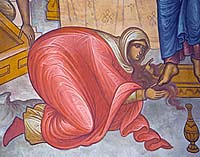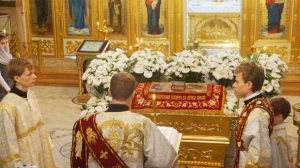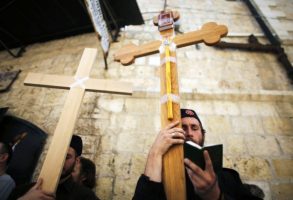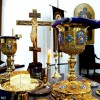O blessed hands! O hair and mouth of the chaste adulteress! We hear this rapterous exclamation during the canon at Compline. But how can an adulteress be chaste? Who can glorify her hands and mouth? What is this, a beautiful paradox? A poet’s excess? In the Church, by the commandment of the Savior, today we remember the action of the sinful woman who annointed Christ in the house of Simon the leper.
 A certain woman, known in the city as a sinner, comes to the house where the wonderworking Christ has been received, where decent people are eating, and silently, tearfully begins to wash the Savior’s head and feet with precious oil. Christ does not prevent her, although the disciples try to “reason“ with the Lord towards a respectable and even humanitarian conclusion: if the myrrh were sold, they could perform many good deeds, maybe feed the poor. But the Savior reveals to His interlocutors the actual meaning of this annointing: For in that she hath poured this ointment on My body,she did it for My burial (Mt 26:12). These words contain a new hindrance for us: why did Christ lay this very great and royal mission – preparation for His burial – on a sinful woman? Is not the solemnity and elevated beauty of this moment lowered by the presence of an unworthy participant?
A certain woman, known in the city as a sinner, comes to the house where the wonderworking Christ has been received, where decent people are eating, and silently, tearfully begins to wash the Savior’s head and feet with precious oil. Christ does not prevent her, although the disciples try to “reason“ with the Lord towards a respectable and even humanitarian conclusion: if the myrrh were sold, they could perform many good deeds, maybe feed the poor. But the Savior reveals to His interlocutors the actual meaning of this annointing: For in that she hath poured this ointment on My body,she did it for My burial (Mt 26:12). These words contain a new hindrance for us: why did Christ lay this very great and royal mission – preparation for His burial – on a sinful woman? Is not the solemnity and elevated beauty of this moment lowered by the presence of an unworthy participant?
These doubts are resolved when we listen attentively to the hymnody of today’s Matins, repeated in the Liturgy: the sticheron of the nun Cassiana – an amazingly poignant and beautiful contemplation of this evangelical event. Lord, the woman who had fallen into many sins, perceiving Thy divinity, took up the role of myrrh-bearer… The woman, found worthy of serving the Savior in this mysterious and prophetic act, was indeed a sinner. But she was transformed into the role of a myrrh-bearer because of the event well known to us: her meeting with Christ. This was not simple astonishment at the miracles of an eloquent preacher, not idle curiosity – but rather, here is an inexpressible and utterly incomparable experience of meeting with True Life, True Love and True Understanding: Perceiving Thy divinity.
When man encounters God, he recovers his real self: the eyes that have seen God are my real eyes; the heart that has been burnt by His words is my real heart. My buried — but never dead — true humanity suddenly reveals itself from under the morass of my longstanding insincerity and mask of falsehood. No one could remain unchanged after this meeting. Paramount in this meeting is the moment of understanding — because man can become so crushed by sin, so enslaved by it, that death may seem to be a comfort and the only way out of this sad slavery. A dark and moonless love of sin, as is sung in the stichera, feasts on man’s wreckage.
You are fortunate if you find someone capable of understanding you and of sympathizing. In Christ, man finds such understanding and sympathy. In the encounter with Christ, sin begins to seem not so absolute and dominating, and man at last understands what he was actually looking for all his life: holiness and purity — that is, true life, which Christ gives abundantly. The sinful woman says nothing, and asks for nothing. She simply does what her loving heart told her to do, and Christ receives her love. He accepts it not out of condescension or pity, but as His sister, as His neighbor, and He entrusts her with a very personal and holy matter: the preparation of His body for burial.
When you read these verses from the Gospel, and the words of the sticharon, then despondency stops and despair disappears, because, as Paul writes, you begin to feel in your life the very love of Christ, which passeth knowledge (Eph. 3:19). Christ loves me even though I am a sinner, and He sends away no one who comes to Him. Even among Christians there are many who find it difficult to give up their sins, their longstanding bad habits – evil comes in poods[1] and leaves in zolotniks[2] , i.e., small coins, drops. But this faith of God in us, this immense love of God, gives such surprising hope and force that this love is capable of resurrecting any man and setting him free from the power of sin. But all of us, both “saints“ and sinners, must learn to believe in man and have reverance for the mystical path in which God leads him to the Kingdom of heaven.
——————————————————————————–
[1] Old Russian weight measure = 16.38 kg
[2] Old Russian weight measure = 4,26 g
Translated from Russian by Olga Bondarenko
Edited by Hierodeacon Samuel (Nedelsky) and Michael C. Marge


















